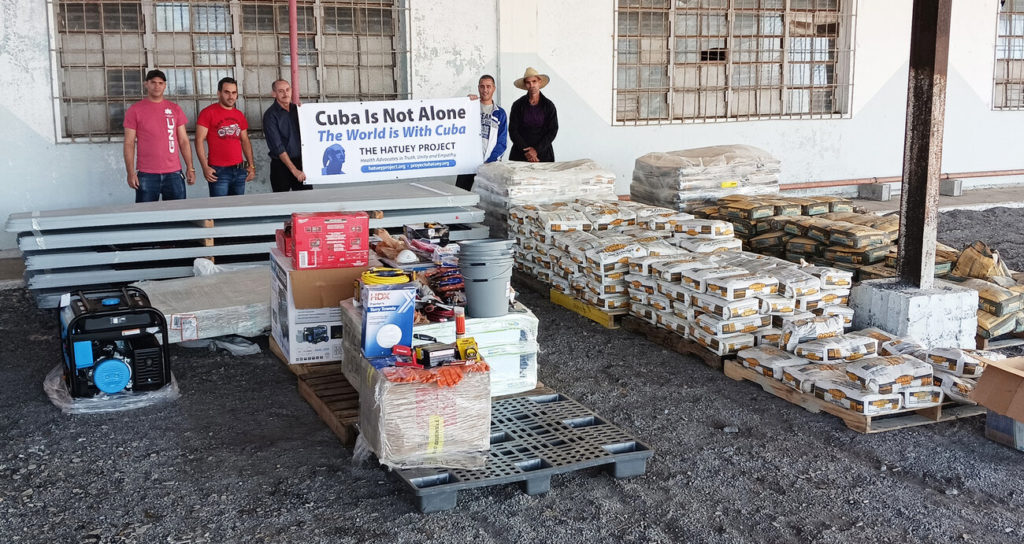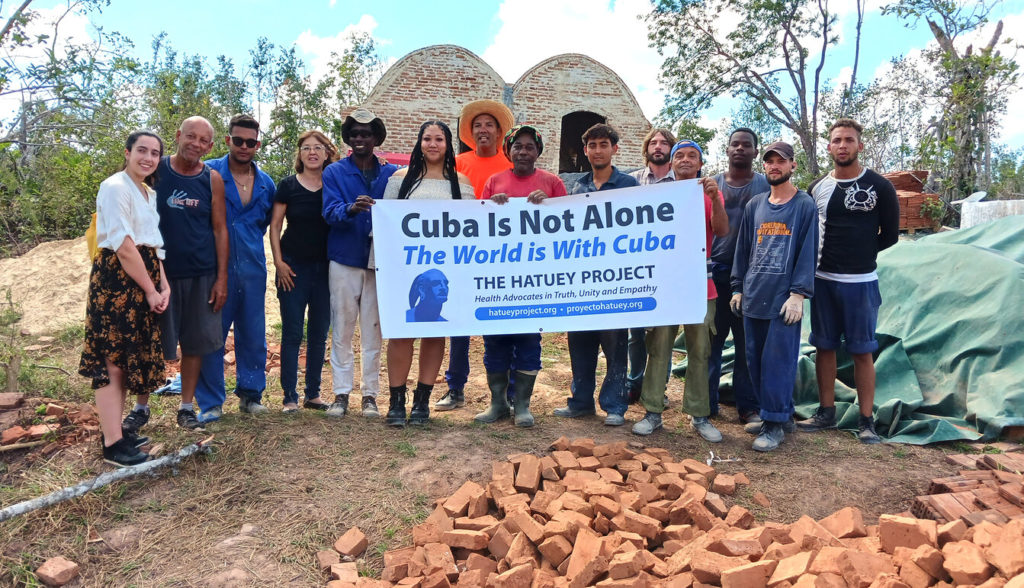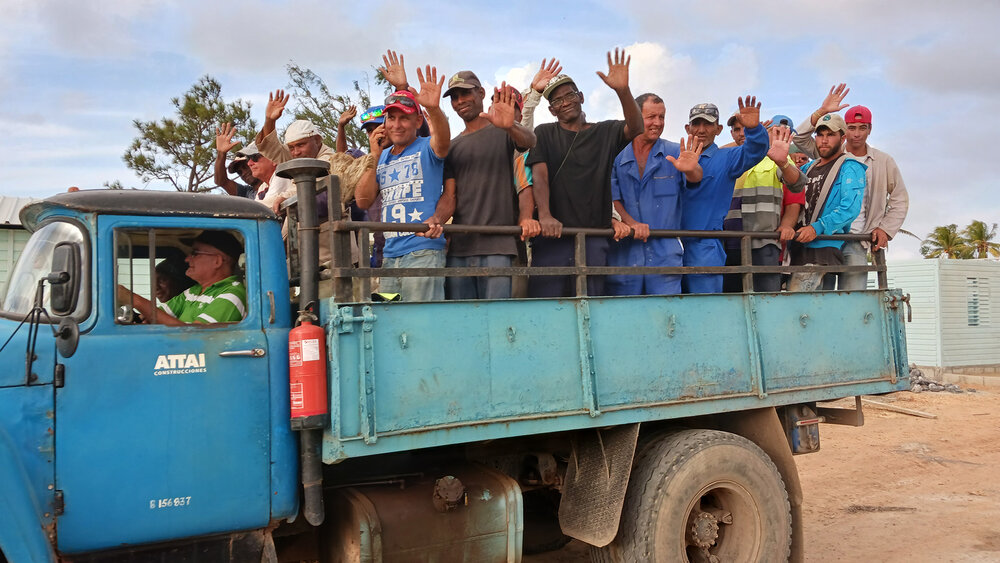Photo: Andira Alves and Jake Tucker of the HATUEY Project hear construction brigade leader Armando Izquierdo Valdez describe the building methods used.
Over 40,000 pounds of construction material were delivered to the western Cuban province of Pinar del Río on Saturday by members of the U.S.-based HATUEY Project to support Cuban residents heavily impacted by Hurricane Ian last September. The HATUEY Project’s name (Health Advocates in Truth, Unity and Empathy) honors Hatuey, the Indigenous man who fought Spanish colonization and was burned at the stake in 1512 for his resistance. He is known as one of Cuba’s first heroes.
The HATUEY Project sent a 40-foot container by ship from Miami to Cuba that arrived on Jan. 19. Thanks to generous donations of community groups and individuals from the United States, Puerto Rico, Australia and Germany, the donation included 18,000 pounds (500 panels) of 3’x12’ sheet metal roofing, 19,200 pounds of concrete, two 12,000 watt electrical generators, windows, plywood and tools — all essential products for home reconstruction.
Donations to HATUEY came from The People’s Forum, the ANSWER Coalition, Movimiento Nacional Hostosiano of Puerto Rico, the Mexico Solidarity Network, the Western Sydney (Australia) Committee in Solidarity with Cuba, and many individuals.

The group met with representatives of the local government and workers to learn about the ongoing recovery efforts in the region. Roughly 120,000 people were affected, with 60% of housing damaged. The electrical grid was downed completely. 11,000 tobacco curing houses were destroyed by the Category 4 storm. Cuba’s famed cigars are a major source of foreign income for Cuba. Nearly all food production was wiped out.
Pinar del Río is the westernmost region of Cuba, most famous for its tobacco production, with agriculture a close second. 48.3% of Pinar del Rio is covered in forests, and it is the largest producer of wood products in Cuba. It has the only factory for electronic components of solar panels in Cuba.
Residents in the hurricane’s direct path were evacuated, and three Cubans died. Comparatively, over 70 people died due to the same hurricane in Florida. Immediately following the storm, the National Defense Council of Cuba (NDC), provincial and municipal governments, together with the community, jumped into action. The NDC is headed by President Miguel Díaz-Canel to address national emergencies, provide resources and support to municipalities in recovery.
They held community discussions, surveyed neighborhoods with case workers to identify the most impacted, and helped to plan long-term recovery. In coming days, families who still need housing will receive for free the materials donated by HATUEY. Additionally, micro-, small-, and medium-sized private businesses (MIPYMES) are partnering with the government to work on the construction.
Within 35 days, the electricity was completely restored. Over the last six months, 25% of housing in Pinar del Río has been recovered, despite immense material shortages due to the U.S. blockade against Cuba. While 46 different entities around the world have sent donations of construction materials, including Mexico and Venezuela, Pinareños and Cubans from other provinces have been working hard to redesign houses with local materials and improve upon their former designs to withstand future hurricanes.

HATUEY coordinator Gloria La Riva explains, “We witnessed the tremendous collective spirit of the Cuban people, from the construction and warehouse workers as well as the communities, to overcome a storm that destroyed so much of the province. Our greatest responsibility is to continue fighting the U.S. blockade which is more harmful than any hurricane.”
In a neighborhood called El Calvario in the municipality of Pinar del Rio, professors Mikel Moreno and Jorge Luis Valla Soto of Havana University’s Heritage Preservation department are working with the university students, also from Havana, to build a new home for a mother and her six children. The unique double-domed Catalonian-inspired design utilizes local materials, such as brick, a special formula of cement, and local wood, to avoid dependence on more expensive materials such as steel. The design keeps the house cool during hot weather, and is built to withstand future hurricanes.
In another community of the township of Pinar del Río, we saw bathrooms being built with concrete brick to shelter from future hurricanes. Many families lost everything when entire houses were destroyed during Hurricane Ian. “In the reinforced bathroom, families will be able to shelter in place, or, if they have to evacuate, they will be able to leave their valuables in these rooms to stay protected,” explained Armando Izquierdo Valdez, construction brigade leader.
Cuban workers from other regions have made great sacrifices to support the people of Pinar del Río, coming from provinces and cities hours away, staying months at a time, and working long days.

“Cuba is an example we need to learn from in what is possible for our own future. Housing is essential to our physical and mental well-being, but in the United States it is viewed as separate. We see luxury apartments coming up overnight, but public goods, like truly affordable housing, public libraries, and hospitals, take years to develop because the United States puts profits over people,” said Andira Alves of the HATUEY Project.
“The Cuban government and people have the will to repair the damage, but due to the criminal U.S. blockade, the resources fall short,” said Jake Tucker, a construction worker in San Antonio who came with the HATUEY Project to witness Cuba’s recovery. “The people of Cuba are progressing towards a full recovery for everyone affected. We came away with a greater understanding of how Cuba’s government and people work together to build their society.”





